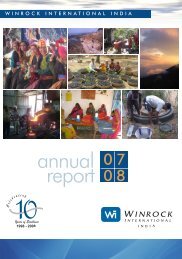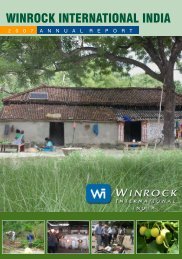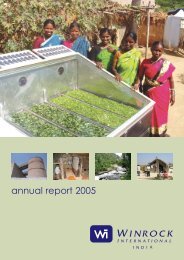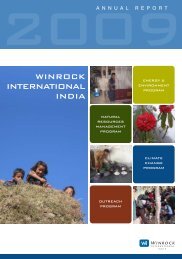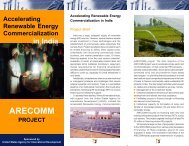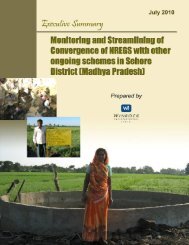IssuE 8 â ApRIl â JuNE 2011 - Winrock International India
IssuE 8 â ApRIl â JuNE 2011 - Winrock International India
IssuE 8 â ApRIl â JuNE 2011 - Winrock International India
Create successful ePaper yourself
Turn your PDF publications into a flip-book with our unique Google optimized e-Paper software.
4<br />
<strong>India</strong>n, Pakistani Companies Win Green Energy Awards<br />
Two <strong>India</strong>n companies which<br />
recycle waste products into<br />
sources of power and a Pakistani<br />
firm that fits energy-saving devices<br />
in homes were honoured with major<br />
green energy awards. Ashden Awards<br />
for Sustainable Energy, is one of the<br />
world's most prestigious green energy<br />
honours, with £20,000 ($32,200, 22,800<br />
euros) prize money.<br />
The British awards, which started in<br />
2001, aim to encourage the greater use<br />
of local clean energy and to address<br />
climate change and alleviate poverty.<br />
Ghanaian firm Toyola Energy Ltd.<br />
won the top prize, the £40,000 Gold<br />
Award, for its success in making stoves<br />
that burn less charcoal than traditional<br />
models and that are accessible to lowincome<br />
families.<br />
The <strong>India</strong>n firms, Abellon CleanEnergy<br />
Ltd. and Husk Power Systems, and<br />
Pakistani company, The Aga Khan<br />
Planning and Building Service, were<br />
among four other international winners.<br />
"Our dream is a world where access to<br />
clean, affordable electricity and fuel can<br />
be enjoyed by the poor, transforming<br />
living standards, reducing CO 2<br />
emissions and easing the pressure<br />
on dwindling forests," said awards<br />
director Sarah Butler-Sloss.<br />
"The 201 1 Ashden Award winners are<br />
making this vision a reality, and their<br />
potential for expansion and replication<br />
is high." Abellon CleanEnergy Ltd.,<br />
based in Gujarat state, western <strong>India</strong>,<br />
was recognised for its business of<br />
producing biomass pellets from crop<br />
waste to fuel industries in the area.<br />
As well as replacing traditional<br />
industrial fuels with a cleaner<br />
alternative, the business also gives<br />
farmers a market for waste products.<br />
Husk Power Systems, based in Bihar<br />
state, eastern <strong>India</strong>, was honoured for<br />
using a common waste product, rice<br />
husks, to produce electricity for remote<br />
villages in the area.<br />
The Ashden Awards judges said that<br />
the novel way of producing electricity<br />
provided a reliable supply and was<br />
cheaper than alternatives.<br />
Pakistani firm, the Aga Khan Planning<br />
and Building Service, was selected for<br />
helping families in mountain villages<br />
save energy and make their homes<br />
warmer through a range of locallyproduced<br />
devices.<br />
Carpenters and metal workers employed<br />
by the company make products including<br />
fuel-efficient stoves, water heaters and<br />
wall and floor insulation.<br />
Source: http://www.renewsindia.com/<br />
biomass_energy.php<br />
5<br />
power plant fuelled by waste<br />
A products and solar energy could<br />
provide researchers w ith a business<br />
and technological blueprint capable of<br />
addressing rural poverty across <strong>India</strong>.<br />
So business and engineering academics<br />
from Aston University and the <strong>India</strong>n<br />
Institute of Technology in Delhi are<br />
overseeing the construction of a<br />
combined heat and power plant (CHP)<br />
in a remote village in northern <strong>India</strong>.<br />
Fuelled by crop waste such as rice<br />
husks and prosopis wood, the 300kw<br />
biomass-solar plant will provide heat,<br />
steam and electricity to downstream<br />
plants, which are also being built as part<br />
of the three year project. This includes a<br />
rice mill, fruit and vegetable processing<br />
plants and a water distillation unit. The<br />
combination of solar and biomass power<br />
will reduce fuel consumption while<br />
allowing round the clock operation.<br />
Aston University Planning CHP Against Fuel Poverty in <strong>India</strong><br />
The plant will allow regional<br />
farmers and their families to access a<br />
cheap, renewable and reliable energy<br />
source that in-turn can help remote<br />
villages to generate an income and<br />
escape from a cycle of ‘fuel poverty’.<br />
The research team wants to use this<br />
pioneering project to create a blueprint<br />
for renewably powered combined heat<br />
and power boilers, capable of being<br />
replicated throughout <strong>India</strong>.<br />
Dr Prasanta Dey, Reader in Operations<br />
Management at Aston Business School<br />
said: “We want to develop a holistic<br />
business model which can be replicated<br />
to grow wealth in rural communities.<br />
In <strong>India</strong>, over 70 per cent of people live<br />
in rural communities. We believe this<br />
project will empower and benefit the<br />
villagers involved, create sustainable<br />
rural development and encourage<br />
entrepreneurialism.”<br />
Dr Philip Davies, Associate Dean of<br />
Research at the School of Engineering<br />
and Applied Science at Aston, argued:<br />
“A reliable and readily available<br />
energy supply is critical for economic<br />
development. Bringing renewable and<br />
sustainable energy supplies to areas<br />
of rural <strong>India</strong> can ensure we can help<br />
people escape from a cycle of poverty.<br />
Most <strong>India</strong> farmers are small holders<br />
with limited technology for processing<br />
and preserving food. Reliable energy<br />
systems are needed to power such<br />
technologies and at the same time create<br />
employment. This research will create<br />
a wealth of ecological and economic<br />
benefits along the entire biomass chain,<br />
and will offer valuable new research in<br />
an evolving industry.”<br />
Source: http://www.recyclingportal.eu/<br />
artikel/26843.shtml<br />
April-June <strong>2011</strong><br />
39







